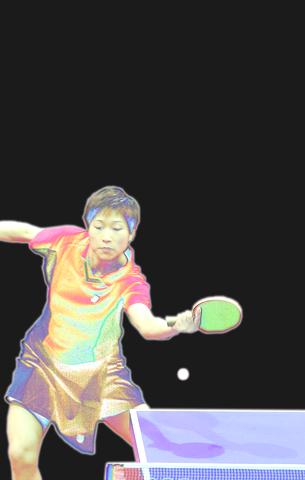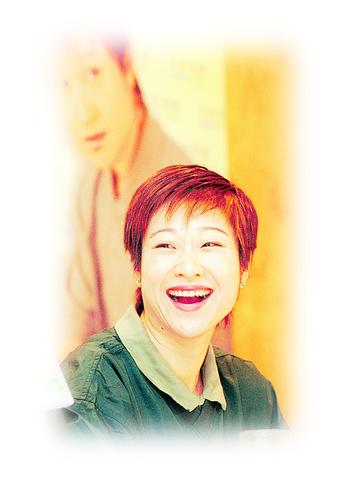Sometimes Chen Jing's (陳靜) quiet demeanor belies her determination. When she plays table tennis, her face is calm, her moves fluid and natural.
During her 10 years in Taiwan, the Hubei native has earned Olympic medals for Taiwan in two consecutive Games. The latest was a bronze, which complemented her silver from the 1996 Atlanta games and her gold from the 1988 Seoul Games, when she still played for China.
It has been a hard, but rewarding, journey from China to Taiwan for the top athlete. "When I was in China, my life was just table tennis. In Taiwan, the focus of my life has shifted to the whole society ? I would say I have a life here," she said.

Leaving her hometown of Wuhan, Hubei Province, to come to Taiwan was initially a strategic move for Chen, who wanted to extend her career in the intensely competitive world of table tennis. After winning gold in Seoul, the then-20-year-old Chen immediately became the world's top-ranked player. But that wasn't enough to protect her position on the deeply talented Chinese national table tennis team. There were dozens of players capable of and willing to take her place.
Like teammate He Zhili (何智麗, now renamed Koyama Chiri, 小山智麗), Chen went to Japan in 1991 to extend her table tennis career and was recruited by Taiwan's computer maker Acer. "I wanted to prove that without being in the Chinese training environment, I could still be the world's top player," she said, when she first represented Taiwan in an international tournament in 1993.
There are few who doubt that she has remained among the best, despite the difficulty associated with training in Taiwan. With Chen's skills and talent, it is hard to find a training partner and to research the strategies of her competitors. Chen had to train with male athletes, who also found it difficult to keep up. So the ROC Sports Association had to help her find training partners from China. However, because China has boycotted Chen since she left, the association could only manage to find overseas Chinese players to train with her. "I know that Taiwan's table tennis environment is not as professional as in China. So every means we've tried is a challenge," she said during her training before the Sydney Olympics.

PHOTO: CHIANG YING-YING, TAIPEI TIMES
But Chen's strong-willed character sustained her. "It has all depended upon Chen's stamina and resolution to keep herself up at the world's top players' level," said her coach, Hsu Jung-chan (許榮展). "Chen Jing is a self-determined and ambitious athlete. Throughout her time in Taiwan she has been playing and training by herself."
Chen's decision to leave China also had to do with trying to find some balance in her life and with finding opportunities for a life after table tennis. "Over the years, table tennis has given me a lot, but I also lost a lot. When all the other girls were having fun in their youth, I was always practicing hard by the table. When the girls had happy smiles on their faces, I always had an pained look on my face as I was so tired," Chen recalled, when she spoke to the Chinese media in Sydney.
Chen once said her main reason for joining Taiwan's Acer table tennis team 10 years ago was to learn about computers. Chen has also been an enthusiastic learner of English, studying at a well-known language center, and she has pursued guest coaching stints, such as one at Princeton University for six months.
In the end, Chen has shifted quite easily from table tennis to a new career in direct marketing. She works with Nu Skin, a cosmetic and health food company. Through a friend, Chen began using and promoting Nu Skin products seven year ago.
Chen said now she has hundreds of reps promoting Nu Skin products around the world. "She is a hardworking dealer who joins every meeting and product introduction eagerly," said Chen's sub manager Liu Jui-chu (劉瑞珠). "Her personality changed through direct-selling. She likes communicating with people and she is not that `cool' anymore," Liu said.
Although she hasn't announced her retirement yet, it is believed that the 32-year-old Chen is approaching the end of her athletic career. "I may give it a try in the entertainment business," said Chen, who, according to a friend, is a KTV lover. So despite having three medals, it seems as if Chen wants to add even more color to her life.

May 18 to May 24 Pastor Yang Hsu’s (楊煦) congregation was shocked upon seeing the land he chose to build his orphanage. It was surrounded by mountains on three sides, and the only way to access it was to cross a river by foot. The soil was poor due to runoff, and large rocks strewn across the plot prevented much from growing. In addition, there was no running water or electricity. But it was all Yang could afford. He and his Indigenous Atayal wife Lin Feng-ying (林鳳英) had already been caring for 24 orphans in their home, and they were in

On May 2, Chinese Nationalist Party (KMT) Chairman Eric Chu (朱立倫), at a meeting in support of Taipei city councilors at party headquarters, compared President William Lai (賴清德) to Hitler. Chu claimed that unlike any other democracy worldwide in history, no other leader was rooting out opposing parties like Lai and the Democratic Progressive Party (DPP). That his statements are wildly inaccurate was not the point. It was a rallying cry, not a history lesson. This was intentional to provoke the international diplomatic community into a response, which was promptly provided. Both the German and Israeli offices issued statements on Facebook

Even by the standards of Ukraine’s International Legion, which comprises volunteers from over 55 countries, Han has an unusual backstory. Born in Taichung, he grew up in Costa Rica — then one of Taiwan’s diplomatic allies — where a relative worked for the embassy. After attending an American international high school in San Jose, Costa Rica’s capital, Han — who prefers to use only his given name for OPSEC (operations security) reasons — moved to the US in his teens. He attended Penn State University before returning to Taiwan to work in the semiconductor industry in Kaohsiung, where he

Australia’s ABC last week published a piece on the recall campaign. The article emphasized the divisions in Taiwanese society and blamed the recall for worsening them. It quotes a supporter of the Taiwan People’s Party (TPP) as saying “I’m 43 years old, born and raised here, and I’ve never seen the country this divided in my entire life.” Apparently, as an adult, she slept through the post-election violence in 2000 and 2004 by the Chinese Nationalist Party (KMT), the veiled coup threats by the military when Chen Shui-bian (陳水扁) became president, the 2006 Red Shirt protests against him ginned up by